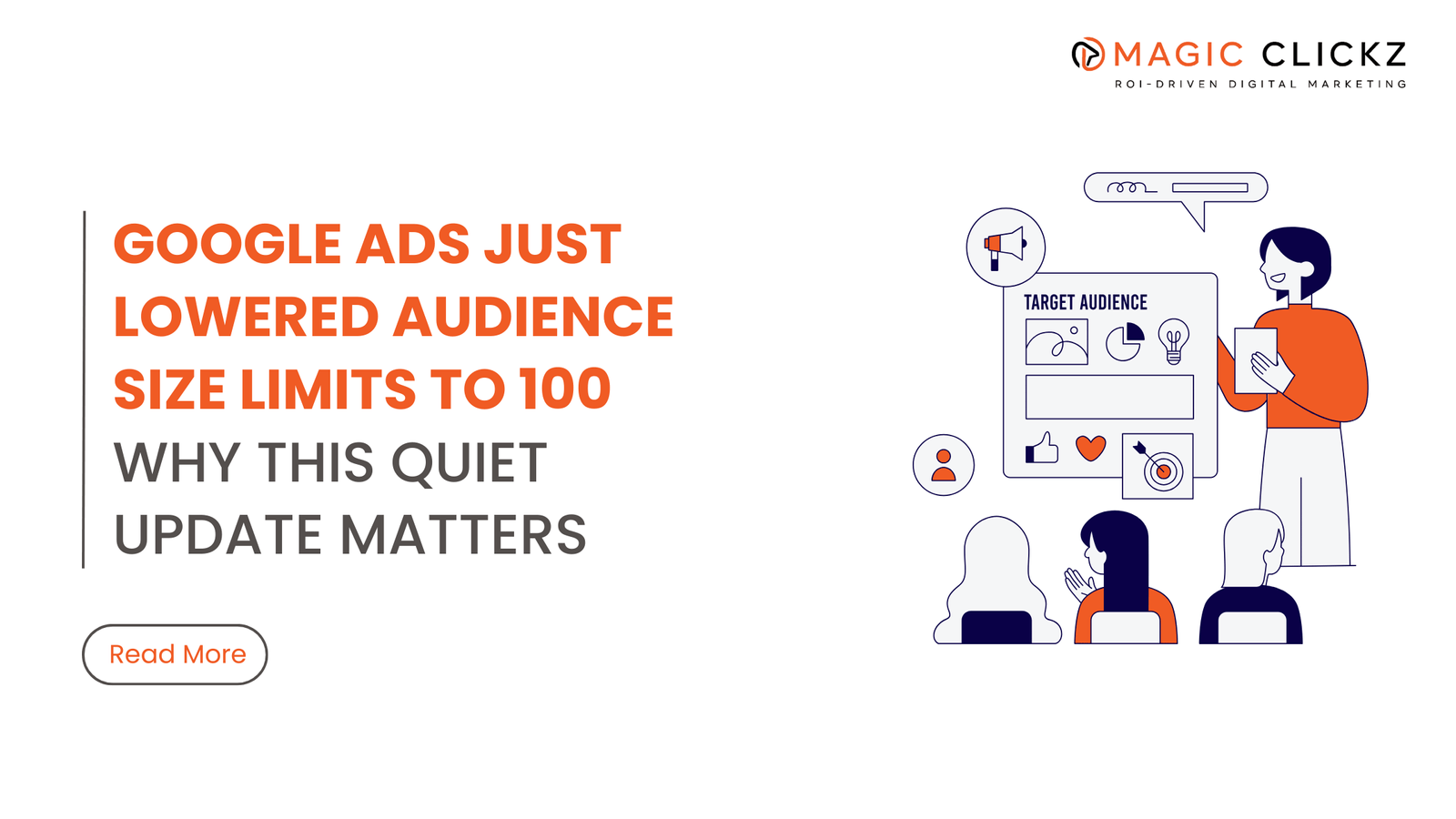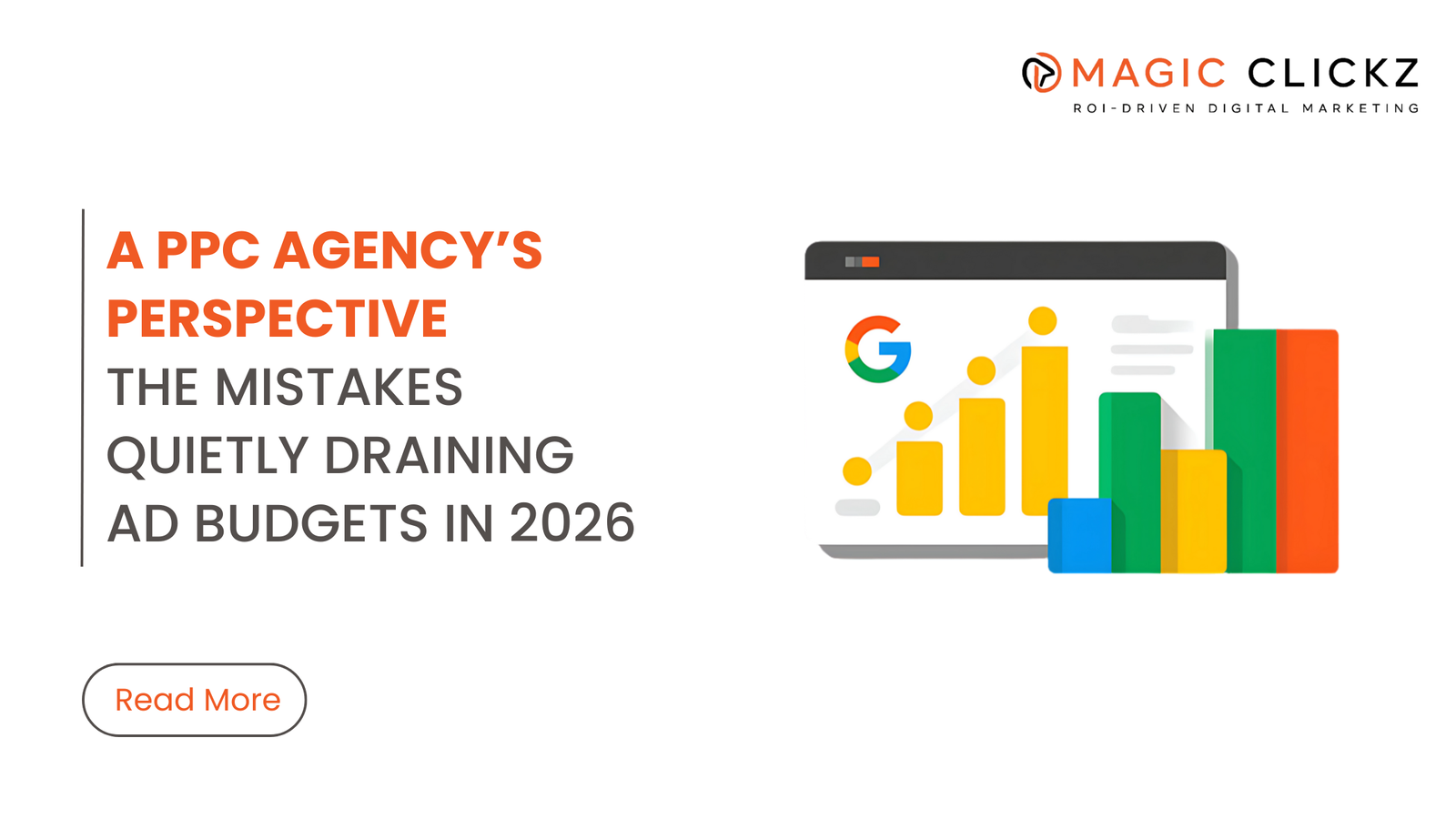Google Ads keyword research is a cornerstone of successful Google Ads campaigns. It’s all about understanding what potential customers are searching for and how to connect with them effectively.
In our last blog, we discussed the importance of keyword specificity and its impact on ad performance, as well as how different keyword match types can improve your targeting strategy. If you haven’t had the chance to read that yet, please take a look at it to get the full picture.
Google Ads Keyword Research: A Complete Guide 2024
This is the only guide you need to read to know how to correctly conduct your Google Ads keyword research from the best Google Ads agency Magic Clickz. Target the right audience by doing the right things, make your ads work better for your campaigns and be successful!
Getting Started with Google’s Keyword Planner
Google’s Keyword Planner is an invaluable tool for marketers, providing insights into keyword performance and search trends. Here’s how to begin:
Accessing Keyword Planner:
- First, sign in to your Google Ads account. If you don’t have one, you can create a free account.
- Once logged in, find the “Tools & Settings” icon (a wrench) in the upper right corner of your dashboard.
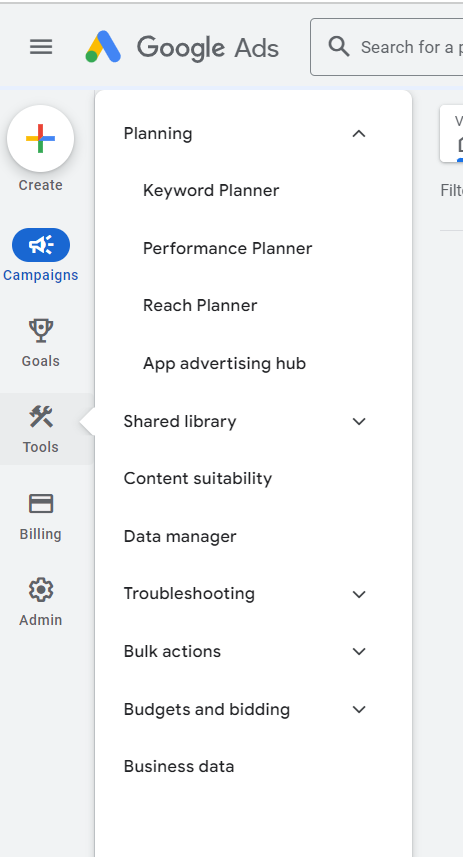
- Under the “Planning” section, click on “Keyword Planner.” This tool allows you to discover new keywords and get performance forecasts for your campaigns.
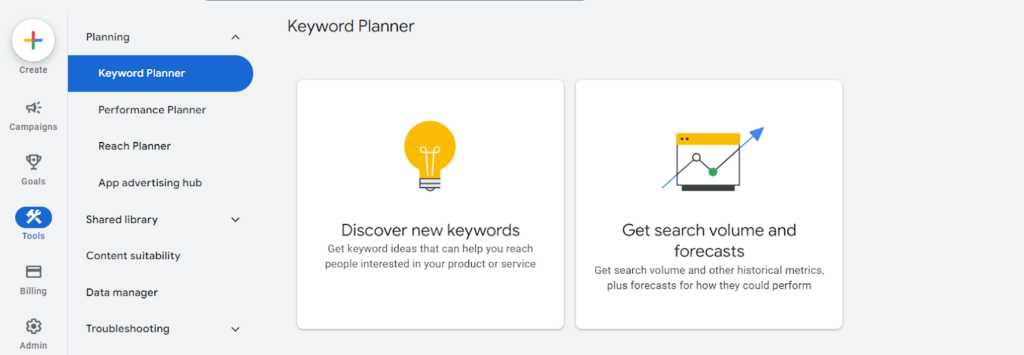
Discovering New Keywords:
- Click on “Discover new keywords.” Here, you can enter words or phrases related to your business or even input your website URL to generate keyword ideas based on your content.

- After clicking “Get Results,” you’ll see a wealth of keyword suggestions. Each entry includes data such as average monthly searches, competition levels, and suggested bids, which can help inform your decisions.
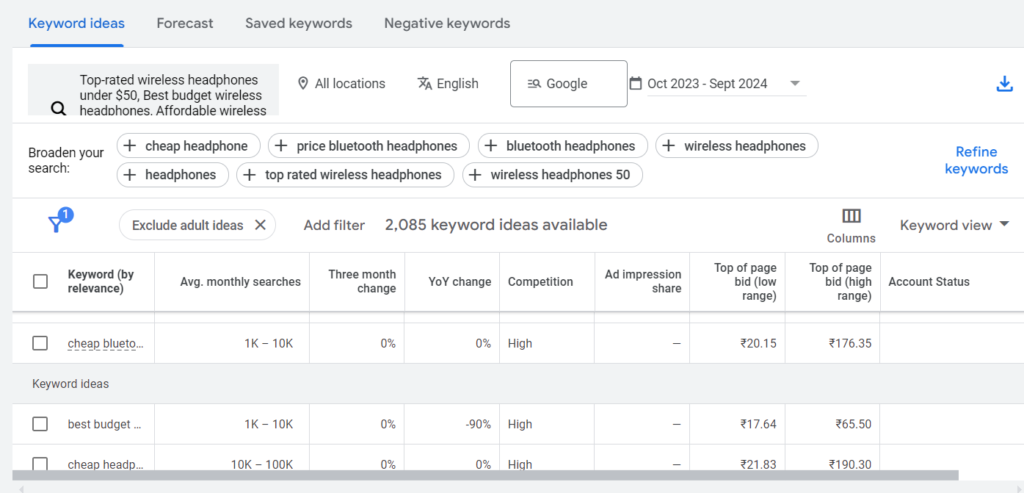
Choosing Your Keywords for Google Ads
Once you have your initial list of keywords, the next step is to refine and choose the best options for your campaigns:
Relevance:
- Prioritise keywords that closely match your products or services. For instance, if you run a local bakery, relevant keywords might include “freshly baked bread,” “cupcake delivery,” or “gluten-free pastries.” This aligns with your keyword strategy for Google Ads campaigns.
Search Volume:
- Look at the average monthly searches for each keyword. While higher search volumes can lead to more traffic, they often come with increased competition. Try to find a balance between volume and relevance. For example, “artisan bread” might have a decent search volume, while “local organic artisan bread” could attract a more niche audience.
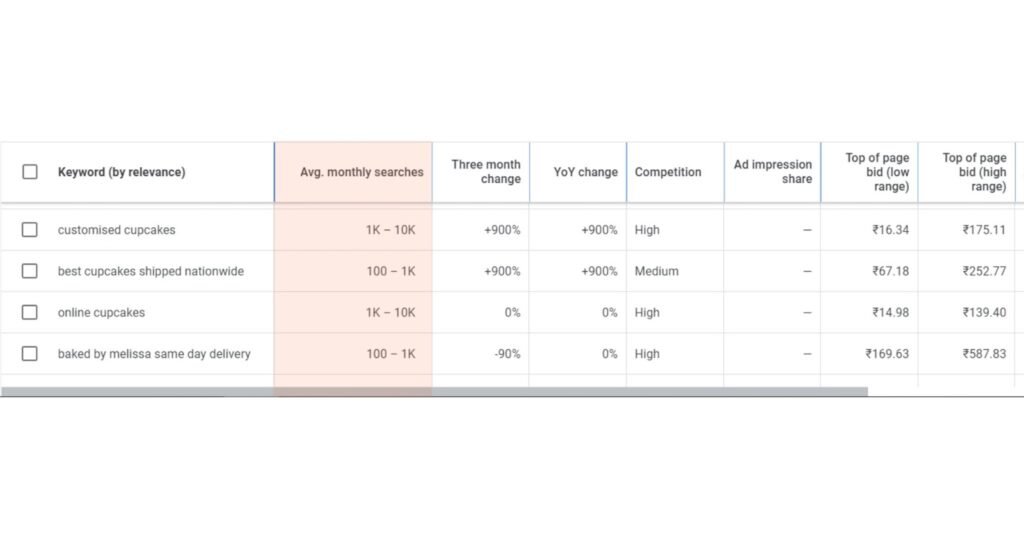
Competition Level:
- Assess the competition for each keyword. Google ranks competition as low, medium, or high. If you’re new to Google Ads, targeting keywords with lower competition can often be more beneficial initially, allowing you to establish a foothold in your market. This is a key aspect of PPC advertising strategies.
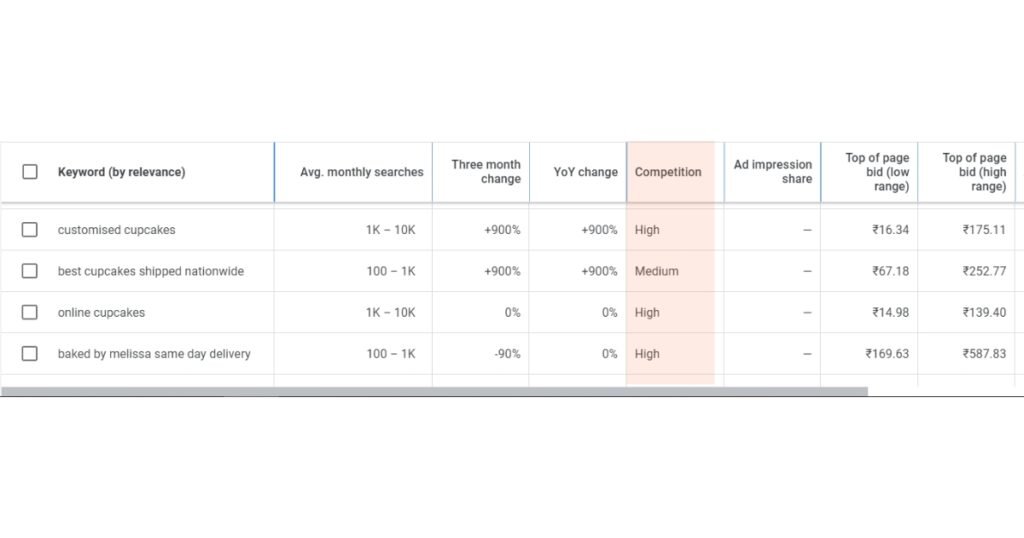
Narrowing Down Your Keyword Lists with Filters
With a growing list of keywords, it’s essential to narrow them down to maintain focus on the most promising options:
Utilising Filters:
- Google’s Keyword Planner provides filters to help you streamline your keyword list. For example, you can filter keywords by average monthly searches (e.g., showing only those with 500+ searches) or competition level (e.g., only low competition).
Identifying High-Potential Keywords:
- After applying these filters, you can easily spot high-potential keywords that align well with your business and have a favourable balance of search volume and competition. This targeted approach can help maximise your advertising budget. This technique can enhance your Google Ads marketing strategy.
Choose Which Platforms You Want Data For
Understanding where your ads will be displayed is crucial for effective targeting:
Selecting Platforms:
- Decide whether your campaigns will run on Search, Display, or both. For example, keywords for search ads might differ from those for display ads because search ads target users actively seeking specific information, while display ads target users browsing the web and may require broader keyword choices.

Platform-Specific Keywords:
- Tailor your keywords according to the platform. For search ads, focus on keywords with high purchase intent, such as “buy organic bread online.” For display ads, consider keywords that create awareness and interest, like “best local bakeries” or “artisan bread recipes.” This is crucial for developing effective paid search marketing strategies.
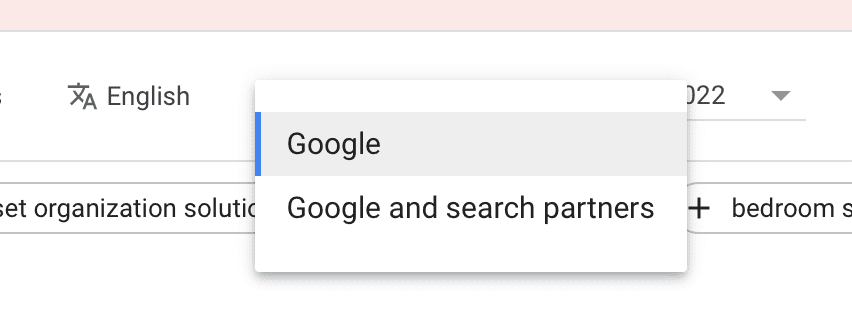
Use Filters to Find High-Potential Keywords
Finding the right keywords can be daunting, but utilising filters can simplify the process:
Keyword Type Filters:
- Segment your keywords by type, such as short-tail versus long-tail keywords. Long-tail keywords (e.g., “best organic sourdough bread in [Your City]”) usually have lower competition and can lead to higher conversion rates because they target users with specific needs. This approach can significantly contribute to your e-commerce keywords strategy for Google Ads.
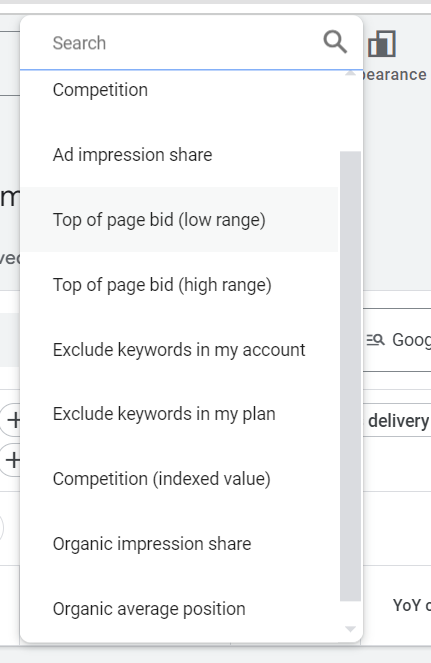
Evaluating Trends:
- Use tools like Google Trends to identify keywords that are trending upward. Adding new keywords or key phrases timely into your strategy can help capture relevant traffic as it emerges.
Refine Keywords Through Google
After compiling a solid list of potential keywords, it’s essential to refine your selections:
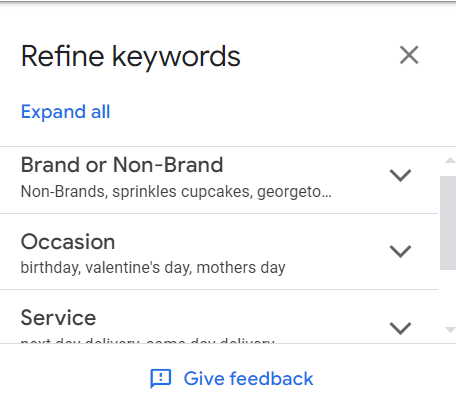
Review Search Intent:
- Ensure that the keywords align with the search intent of your target audience. For example, someone searching for “how to bake sourdough bread” may be looking for information, while someone searching for “buy sourdough bread near me” has a clear intent to purchase.
Testing and Iterating:
- Implement your selected keywords in your Google Ads campaigns, and monitor their performance closely. Use A/B testing to compare the effectiveness of different keywords and ad copies. Adjust your strategy based on the results to optimise performance. For instance, if “buy organic sourdough bread” performs significantly better than “sourdough recipes,” it may make sense to allocate more budget to that keyword. This iterative process is crucial for refining your keyword research for PPC.
Conducting keyword research for Google Ads is an ongoing process that can significantly impact your advertising success. By leveraging tools like Google’s Keyword Planner, filtering your keyword lists, and continually refining your choices based on performance and trends, you can effectively target your audience and maximise the results of your campaigns. Remember, the right keywords can make all the difference in driving traffic and conversions. With this practical approach, you’re well on your way to crafting effective Google Ads that resonate with your audience!
What About Third-Party Keyword Research Tools?
There are many keyword research tools out there that can make your research process easier and provide valuable insights for advertisers. While we prefer doing our keyword research manually using Google Keyword Planner, other platforms offer unique advantages.
- Semrush is fantastic for finding questions-based keywords. This feature allows you to discover keywords that people are asking about, which is great if you want to promote helpful resources.

- Ahrefs provides keyword insights for not just Google Ads but also for Bing and YouTube Ads. If you plan to run campaigns across multiple platforms, Ahrefs could be a solid choice.

- SpyFu excels at competitor analysis. If you’re curious about the keywords your competitors are targeting and bidding on, this tool can give you quick and actionable insights.

Ultimately, the decision is yours! While we believe in the power of careful manual keyword analysis, integrating these third-party tools into your research can enhance your effectiveness. At Magic Clickz, recognized as the best Google Ads agency, we’re committed to helping you maximise your advertising efforts. By utilising a mix of manual research and powerful tools, you can develop a robust keyword strategy that drives performance and achieves your business goals.
Need More Help with Google Ads Keyword Research?
Navigating the complexities of keyword strategy can overwhelm many businesses, often leading to wasted budgets and missed opportunities. You don’t have to face these challenges alone.
Magic Clickz, the best digital marketing agency in Indore, is here to help! As a top-rated digital marketing agency, we specialise in creating tailored keyword strategies that drive traffic and conversions. Our experts leverage advanced tools to identify high-performing keywords that connect you with the right audience.
Whether you need comprehensive Google Ads services, PPC management services, or assistance with developing an effective keyword strategy for your Google Ads campaigns, we’ve got you covered.
Unlock the full potential of your Google Ads campaigns with Magic Clickz.
Contact us today to empower your business and elevate your digital marketing efforts!
FAQs
What is keyword research, and why is it important?
Keyword research is the process of identifying the terms and phrases that potential customers use to search for products or services. It’s crucial for Google Ads keyword research because it helps optimise your ad campaigns, ensuring that you reach the right audience and improve your chances of conversions. Implementing keyword research best strategies can significantly enhance your ad performance and decrease your ad spend.
What are long-tail keywords?
Long-tail keywords are longer, more specific phrases that typically have lower search volume but higher intent. They help you reach a targeted audience in Google Ads campaign management, increasing the likelihood of conversions because these users are often further along in the buying process. Utilising long-tail keywords is one of the effective PPC keyword research guide strategies.
How do I choose the right keywords for my Google Ads campaigns?
Start by identifying relevant keywords that reflect your business offerings. Utilise tools like Google’s Keyword Planner, analyse search volume and competition and consider your audience’s intent to make informed decisions. For the best results, working with a PPC management services provider can significantly improve your strategy.
What common mistakes should I avoid in keyword research?
Some common mistakes in Google Ads keyword research include targeting overly broad keywords, ignoring negative keywords, neglecting long-tail keywords, and failing to regularly update your keyword strategy based on performance data. Following keywords research best strategies can help you avoid these pitfalls.
How often should I conduct keyword research?
Keyword research should be an ongoing process. Regularly revisit your keywords to adapt to changes in search trends, customer behaviour, and market dynamics. Monthly reviews are recommended as part of a solid Google Ads services strategy to maintain effective campaigns and refine your keyword research for e-commerce businesses.
What are negative keywords, and why are they important?
Negative keywords are terms you exclude from your campaigns to prevent your ads from showing for irrelevant searches. Using negative keywords in Google Ads management helps optimise your ad spend by ensuring that you only attract clicks from genuinely interested users. This is crucial for effective PPC management services.
How can I measure the success of my keyword strategy?
Track metrics such as click-through rates (CTR), conversion rates, and quality scores in Google Ads. Regularly analyse these metrics to assess the effectiveness of your Google Ads keyword research and make adjustments as needed. This helps refine your PPC keyword research guide for future campaigns.
What role do third-party tools play in keyword research?
Third-party tools like SEMrush, Ahrefs, and SpyFu can provide valuable insights into keyword performance, competitor strategies, and search trends, enhancing your Google Ads keyword research process and overall campaign effectiveness. They can help you identify effective keyword research for e-commerce businesses.
Can I use the same keywords for different ad campaigns?
While some keywords can be used across campaigns, it’s essential to tailor your keyword strategy based on the specific goals and target audiences of each campaign to maximise effectiveness. Google Ads campaign management experts can help customise your approach for each campaign and ensure optimal use of your PPC management services.
What are some examples of effective keywords for e-commerce businesses?
Effective keywords for e-commerce in Google Ads services might include phrases like “buy [product name] online,” “best [product type] deals,” and “affordable [product category].” Focusing on product-specific and long-tail keywords is part of keyword research best strategies, which can improve targeting and conversions.















